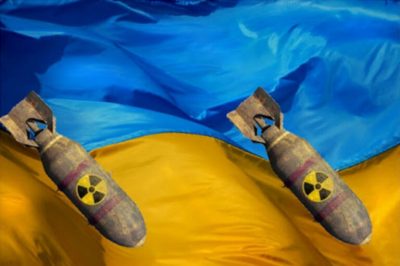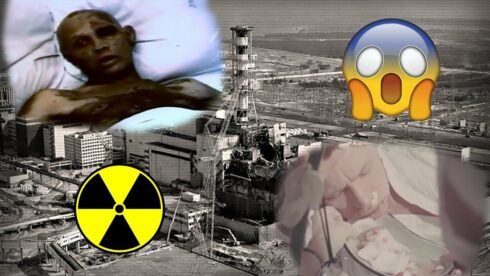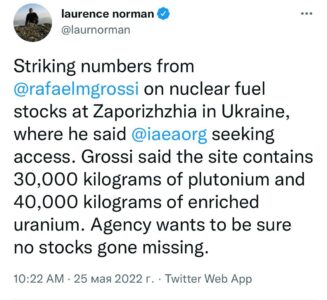Was Ukraine Building A Dirty Bomb?

All Global Research articles can be read in 51 languages by activating the “Translate Website” drop down menu on the top banner of our home page (Desktop version).
To receive Global Research’s Daily Newsletter (selected articles), click here.
Visit and follow us on Instagram, Twitter and Facebook. Feel free to repost and share widely Global Research articles.
***
Just before the beginning of Ukraine’s war with Russia, Vladimir Putin uttered a key phrase, the meaning of which was that Russia could not allow Ukraine to reacquire even tactical nuclear weapons and that Kiev was literally one step away from creating them. It was this emphasis that immediately fell out of the public spotlight amid claims of “denazification” and “demilitarization”. What is a dirty nuclear bomb and how likely is Kiev to have one?
The classic nuclear charge has a monstrous destructive power, but the effect of using such weapons is relatively short-lived. Yes, indeed, during a nuclear explosion extremely dangerous isotopes are formed, including strontium-89, strontium-90, cesium-137, zinc-64 and tantalum-181. These isotopes, once in the body, accumulate there, causing severe and often incurable diseases. For example, radioactive iodine accumulates in the thyroid gland, cesium in muscles, strontium in bones and so on.
At the same time, the affected area of a nuclear explosion denuclearizes rather quickly, i.e. actively loses radioactivity. Hiroshima and Nagasaki, the only cities in the history of mankind to have been nuclear bombed, are a case in point. The masses were under the impression that they left a scorched desert for decades, which is not true. As early as August 1949, the Hiroshima Peace Memorial City Construction Law was passed, which gave an immediate start to the total reconstruction of the city. That is, little more than four years had passed since the nuclear strike.
The principle of the dirty bomb is different. This type of munition is much simpler in its construction and does not require complex technical solutions. In fact, it is simply a delivery vehicle (missile, bomb or artillery shell) to which a container with radioactive filler is attached. One of the potentially most effective and therefore dangerous applications in general involves simply spraying radioactive dust from an airplane or any other aircraft.
Dangerous isotopes with long half-lives are deposited on the surface of the earth, plants, and further into the ground and aquifers, making the area dangerous to live in for many decades. To a man to develop radiation sickness it is enough to get just one sievert dose (Sv), a dose of 3 to 5 Sv leads either to death in a couple of months or to the development of cancer, 6 to 10 Sv is a guaranteed death as the irreversible death of bone marrow begins.

The consequences of the Chernobyl explosion are close to a dirty bomb explosion
The issue of the possibility of Ukraine, which renounced nuclear missile weapons as part of the Budapest Memorandum, creating a dirty bomb has been repeatedly considered by various experts. Most of them agreed that it is impossible for a number of reasons.
First, for political reasons: Western allies will not give the unpredictable government in Kiev such a bargaining chip. Second, Ukraine does not have the appropriate technical capabilities, no centrifuge capacity for uranium enrichment, and no suitable means of delivery. Some experts do not agree with the latter assertion, because a large amount of equipment and specialists capable of creating such means has been preserved since the Soviet Union days.
Ukraine currently holds a large amount of spent nuclear fuel that has not been removed from the territory of Ukraine since 2020 and that has been stored on the territory of nuclear power plants awaiting the construction of a nuclear fuel storage facility in the Chernobyl Exclusion Zone.
In addition, the Kiev regime had accumulated 30 tons of plutonium and 40 tons of enriched uranium at the Zaporizhzhya nuclear power plant. This was reported by Wall Street Journal journalist Lawrence Norman, citing IAEA Director General Raphael Grossi. The head of the international nuclear watchdog agency noted that although the nuclear power plant is under Russian control, it is run by Ukrainian reactors. That is why the IAEA needs to urgently send its experts to assess the situation and find out whether there are stocks of uranium and plutonium missing (alas, earlier Kiev has lost Javelins, bulletproof vests, etc.).

Laurence Norman’s post
In response, Ukraine’s Energoatom announced the IAEA head’s words as a fake and tried to explain that plutonium and enriched uranium are only in fuel assemblies (tubes) at nuclear power plants, while spent nuclear fuel is present at every nuclear power plant.
“This is a sly thing. If the state has sufficient competence to dismantle fuel assemblies, the spent nuclear fuel can be used to make weapon-grade isotopes. And for sure, in order to fill a missile warhead with it, a subversive charge, to arrange a dirty bomb, when the territory is contaminated without a nuclear explosion. And the activity of such a bomb will be higher than that of a cobalt bomb by one and a half times,” said the expert.
“Let’s take the Bushehr nuclear power plant in Iran as an example – the whole Western world demanded from Russia to close the project at first, and then they agreed – Russia takes the spent nuclear fuel so that Iranians would not accidentally start using it illegally for weapons-military purposes. For some reason it was scary in Iran, it was a stumbling block, but with Ukraine it is not frightening”.
As for the creation of delivery vehicles, nothing is impossible. The legendary Yuzhmash plant of the past is really going through a period of total decay today, while, remember, for many decades it has produced a fairly wide range of products for the space industry, including fuel modules. In other words, both the documentation and some of the production facilities that make it possible to assemble a hull of especially durable metals, where a load of spent nuclear fuel could be placed, are likely to have remained in place.
Nor would it have been a matter of delivery vehicles. If the Neptun missiles of their own production failed, the allies are full of their own much more powerful and long-range counterparts. Arms deliveries to Ukraine did not open with the start of the Russian special operation. And there have been serious discussions about supplying Kiev with heavy weapons.
In conclusion, the threat of Kiev creating a dirty bomb is serious. This is confirmed, albeit indirectly, by statements by experts, journalists around the world, and Russian officials. Despite the revelation that a large amount of spent nuclear fuel is stored at the Zaporizhzhia nuclear power plant, no one knows reliably how much is stored at other nuclear power plants. We can only hope for the remnants of the adequacy of the Ukrainian government. Otherwise, it could do irreparable harm not only to Russia and Belarus, but also to their neighbours.
*
Note to readers: Please click the share buttons above or below. Follow us on Instagram, Twitter and Facebook. Feel free to repost and share widely Global Research articles.
Featured image: Possible creation of a nuclear bomb in Ukraine (Source: South Front)

